Organisational Structure and Behaviour Analysis: NHS Report
VerifiedAdded on 2021/02/20
|12
|2398
|87
Report
AI Summary
This report delves into the organizational behavior of the National Health Service (NHS) in the UK, examining its structure, culture, and the influences of power and politics, particularly in the context of Brexit. The report introduces the NHS, outlining its vision, mission, and aims, and then analyzes the impact of organizational culture, including power, role, task, and person cultures, using Handy's model. It assesses the effect of Brexit on the NHS, especially concerning staffing and workload, and explores different types of power within the organization, such as reward and coercive power. Furthermore, the report discusses motivation theories, including Maslow's hierarchy of needs and process theories like Mintzberg's management roles, to suggest ways to enhance employee motivation and address challenges faced by the NHS. Recommendations focus on building a strong workforce to mitigate the negative impacts of Brexit and improve organizational performance.
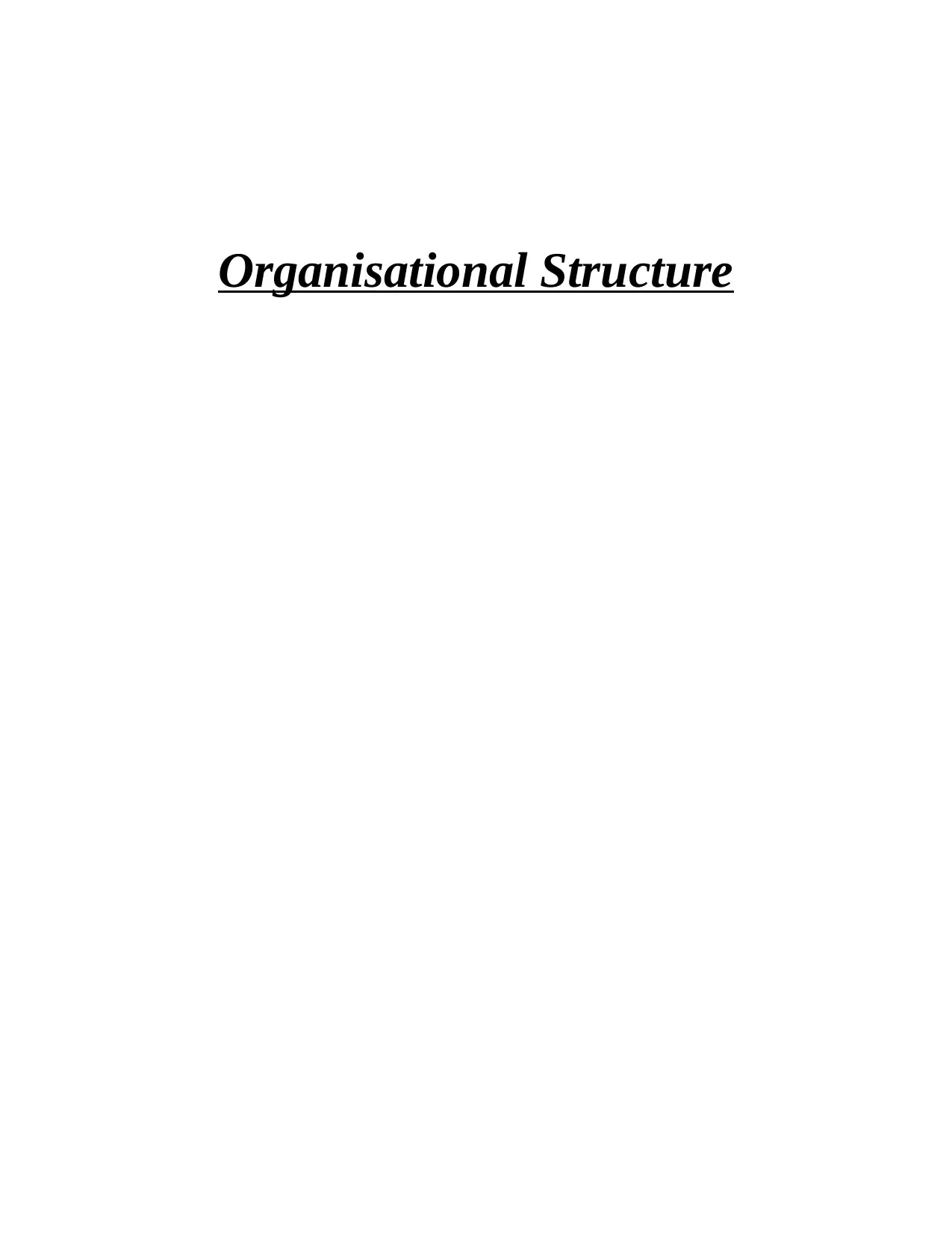
Organisational Structure
Paraphrase This Document
Need a fresh take? Get an instant paraphrase of this document with our AI Paraphraser
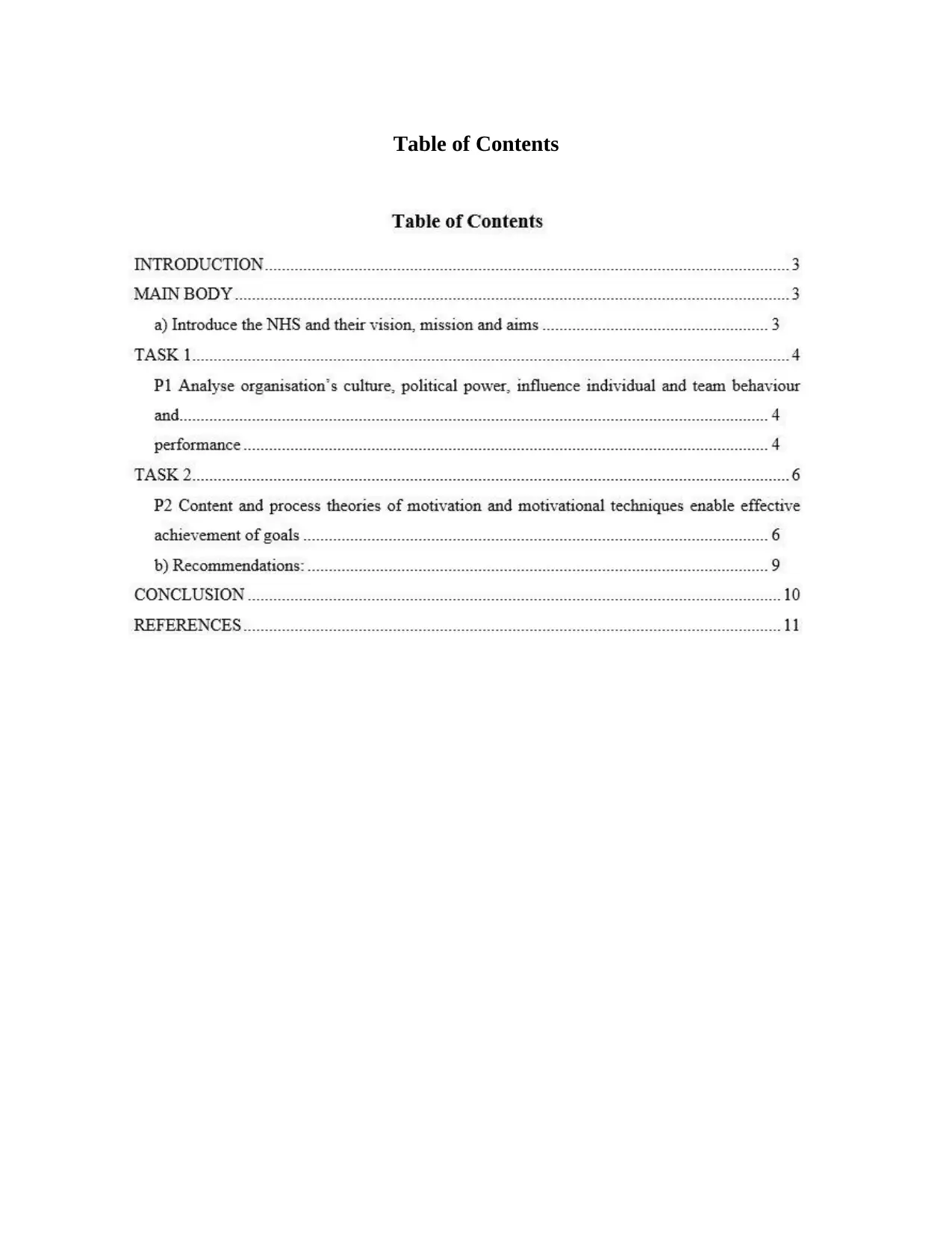
Table of Contents
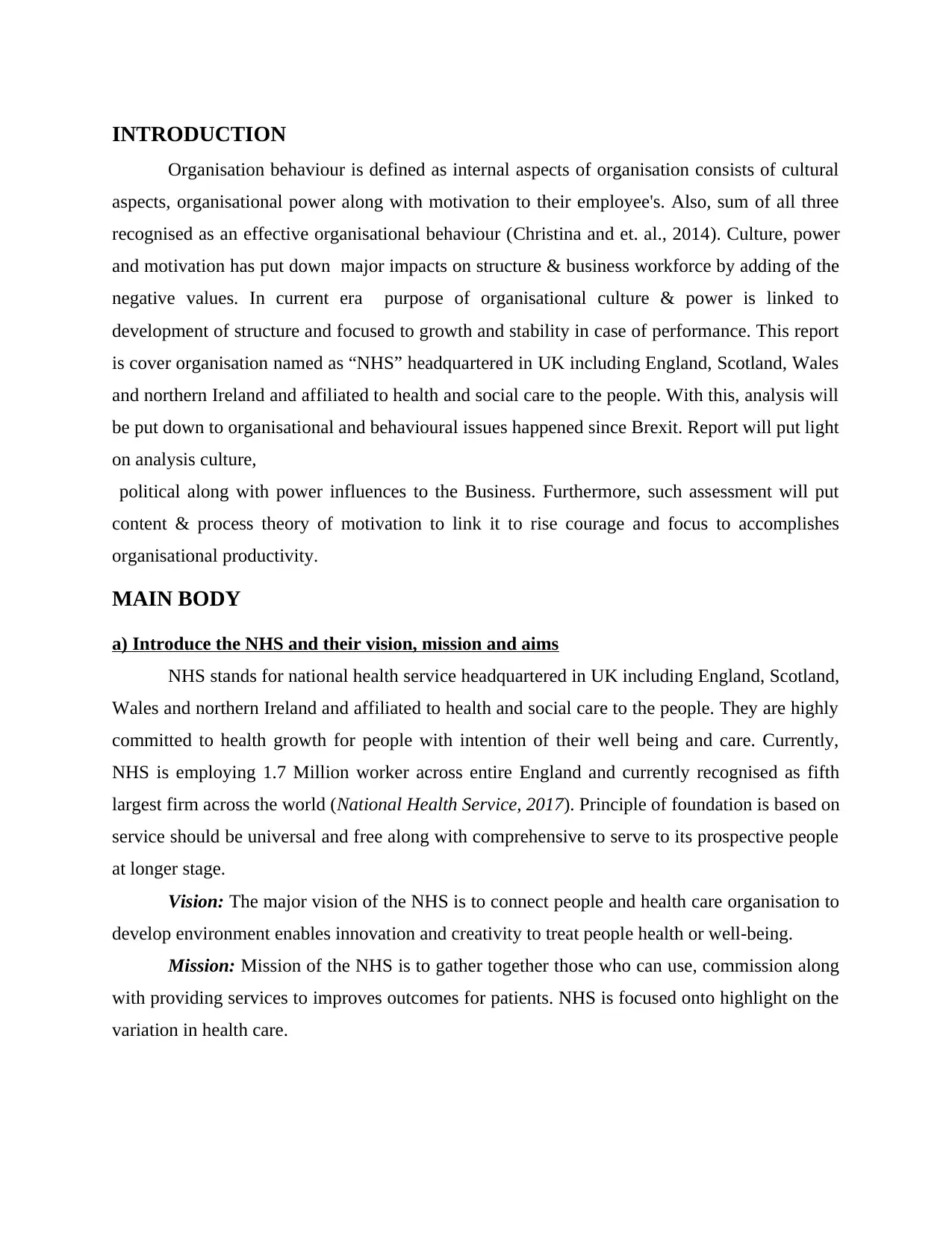
INTRODUCTION
Organisation behaviour is defined as internal aspects of organisation consists of cultural
aspects, organisational power along with motivation to their employee's. Also, sum of all three
recognised as an effective organisational behaviour (Christina and et. al., 2014). Culture, power
and motivation has put down major impacts on structure & business workforce by adding of the
negative values. In current era purpose of organisational culture & power is linked to
development of structure and focused to growth and stability in case of performance. This report
is cover organisation named as “NHS” headquartered in UK including England, Scotland, Wales
and northern Ireland and affiliated to health and social care to the people. With this, analysis will
be put down to organisational and behavioural issues happened since Brexit. Report will put light
on analysis culture,
political along with power influences to the Business. Furthermore, such assessment will put
content & process theory of motivation to link it to rise courage and focus to accomplishes
organisational productivity.
MAIN BODY
a) Introduce the NHS and their vision, mission and aims
NHS stands for national health service headquartered in UK including England, Scotland,
Wales and northern Ireland and affiliated to health and social care to the people. They are highly
committed to health growth for people with intention of their well being and care. Currently,
NHS is employing 1.7 Million worker across entire England and currently recognised as fifth
largest firm across the world (National Health Service, 2017). Principle of foundation is based on
service should be universal and free along with comprehensive to serve to its prospective people
at longer stage.
Vision: The major vision of the NHS is to connect people and health care organisation to
develop environment enables innovation and creativity to treat people health or well-being.
Mission: Mission of the NHS is to gather together those who can use, commission along
with providing services to improves outcomes for patients. NHS is focused onto highlight on the
variation in health care.
Organisation behaviour is defined as internal aspects of organisation consists of cultural
aspects, organisational power along with motivation to their employee's. Also, sum of all three
recognised as an effective organisational behaviour (Christina and et. al., 2014). Culture, power
and motivation has put down major impacts on structure & business workforce by adding of the
negative values. In current era purpose of organisational culture & power is linked to
development of structure and focused to growth and stability in case of performance. This report
is cover organisation named as “NHS” headquartered in UK including England, Scotland, Wales
and northern Ireland and affiliated to health and social care to the people. With this, analysis will
be put down to organisational and behavioural issues happened since Brexit. Report will put light
on analysis culture,
political along with power influences to the Business. Furthermore, such assessment will put
content & process theory of motivation to link it to rise courage and focus to accomplishes
organisational productivity.
MAIN BODY
a) Introduce the NHS and their vision, mission and aims
NHS stands for national health service headquartered in UK including England, Scotland,
Wales and northern Ireland and affiliated to health and social care to the people. They are highly
committed to health growth for people with intention of their well being and care. Currently,
NHS is employing 1.7 Million worker across entire England and currently recognised as fifth
largest firm across the world (National Health Service, 2017). Principle of foundation is based on
service should be universal and free along with comprehensive to serve to its prospective people
at longer stage.
Vision: The major vision of the NHS is to connect people and health care organisation to
develop environment enables innovation and creativity to treat people health or well-being.
Mission: Mission of the NHS is to gather together those who can use, commission along
with providing services to improves outcomes for patients. NHS is focused onto highlight on the
variation in health care.
⊘ This is a preview!⊘
Do you want full access?
Subscribe today to unlock all pages.

Trusted by 1+ million students worldwide
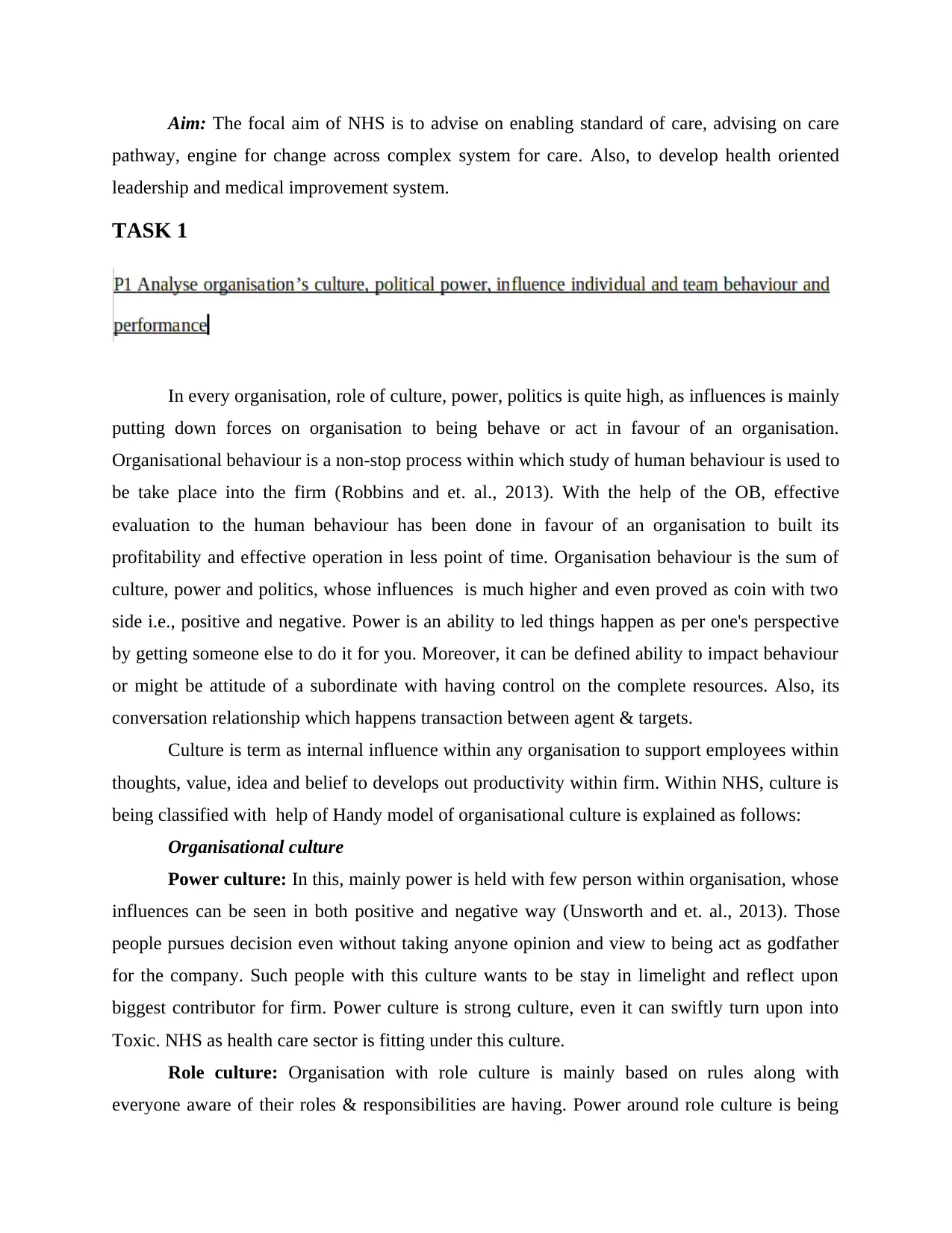
Aim: The focal aim of NHS is to advise on enabling standard of care, advising on care
pathway, engine for change across complex system for care. Also, to develop health oriented
leadership and medical improvement system.
TASK 1
In every organisation, role of culture, power, politics is quite high, as influences is mainly
putting down forces on organisation to being behave or act in favour of an organisation.
Organisational behaviour is a non-stop process within which study of human behaviour is used to
be take place into the firm (Robbins and et. al., 2013). With the help of the OB, effective
evaluation to the human behaviour has been done in favour of an organisation to built its
profitability and effective operation in less point of time. Organisation behaviour is the sum of
culture, power and politics, whose influences is much higher and even proved as coin with two
side i.e., positive and negative. Power is an ability to led things happen as per one's perspective
by getting someone else to do it for you. Moreover, it can be defined ability to impact behaviour
or might be attitude of a subordinate with having control on the complete resources. Also, its
conversation relationship which happens transaction between agent & targets.
Culture is term as internal influence within any organisation to support employees within
thoughts, value, idea and belief to develops out productivity within firm. Within NHS, culture is
being classified with help of Handy model of organisational culture is explained as follows:
Organisational culture
Power culture: In this, mainly power is held with few person within organisation, whose
influences can be seen in both positive and negative way (Unsworth and et. al., 2013). Those
people pursues decision even without taking anyone opinion and view to being act as godfather
for the company. Such people with this culture wants to be stay in limelight and reflect upon
biggest contributor for firm. Power culture is strong culture, even it can swiftly turn upon into
Toxic. NHS as health care sector is fitting under this culture.
Role culture: Organisation with role culture is mainly based on rules along with
everyone aware of their roles & responsibilities are having. Power around role culture is being
pathway, engine for change across complex system for care. Also, to develop health oriented
leadership and medical improvement system.
TASK 1
In every organisation, role of culture, power, politics is quite high, as influences is mainly
putting down forces on organisation to being behave or act in favour of an organisation.
Organisational behaviour is a non-stop process within which study of human behaviour is used to
be take place into the firm (Robbins and et. al., 2013). With the help of the OB, effective
evaluation to the human behaviour has been done in favour of an organisation to built its
profitability and effective operation in less point of time. Organisation behaviour is the sum of
culture, power and politics, whose influences is much higher and even proved as coin with two
side i.e., positive and negative. Power is an ability to led things happen as per one's perspective
by getting someone else to do it for you. Moreover, it can be defined ability to impact behaviour
or might be attitude of a subordinate with having control on the complete resources. Also, its
conversation relationship which happens transaction between agent & targets.
Culture is term as internal influence within any organisation to support employees within
thoughts, value, idea and belief to develops out productivity within firm. Within NHS, culture is
being classified with help of Handy model of organisational culture is explained as follows:
Organisational culture
Power culture: In this, mainly power is held with few person within organisation, whose
influences can be seen in both positive and negative way (Unsworth and et. al., 2013). Those
people pursues decision even without taking anyone opinion and view to being act as godfather
for the company. Such people with this culture wants to be stay in limelight and reflect upon
biggest contributor for firm. Power culture is strong culture, even it can swiftly turn upon into
Toxic. NHS as health care sector is fitting under this culture.
Role culture: Organisation with role culture is mainly based on rules along with
everyone aware of their roles & responsibilities are having. Power around role culture is being
Paraphrase This Document
Need a fresh take? Get an instant paraphrase of this document with our AI Paraphraser
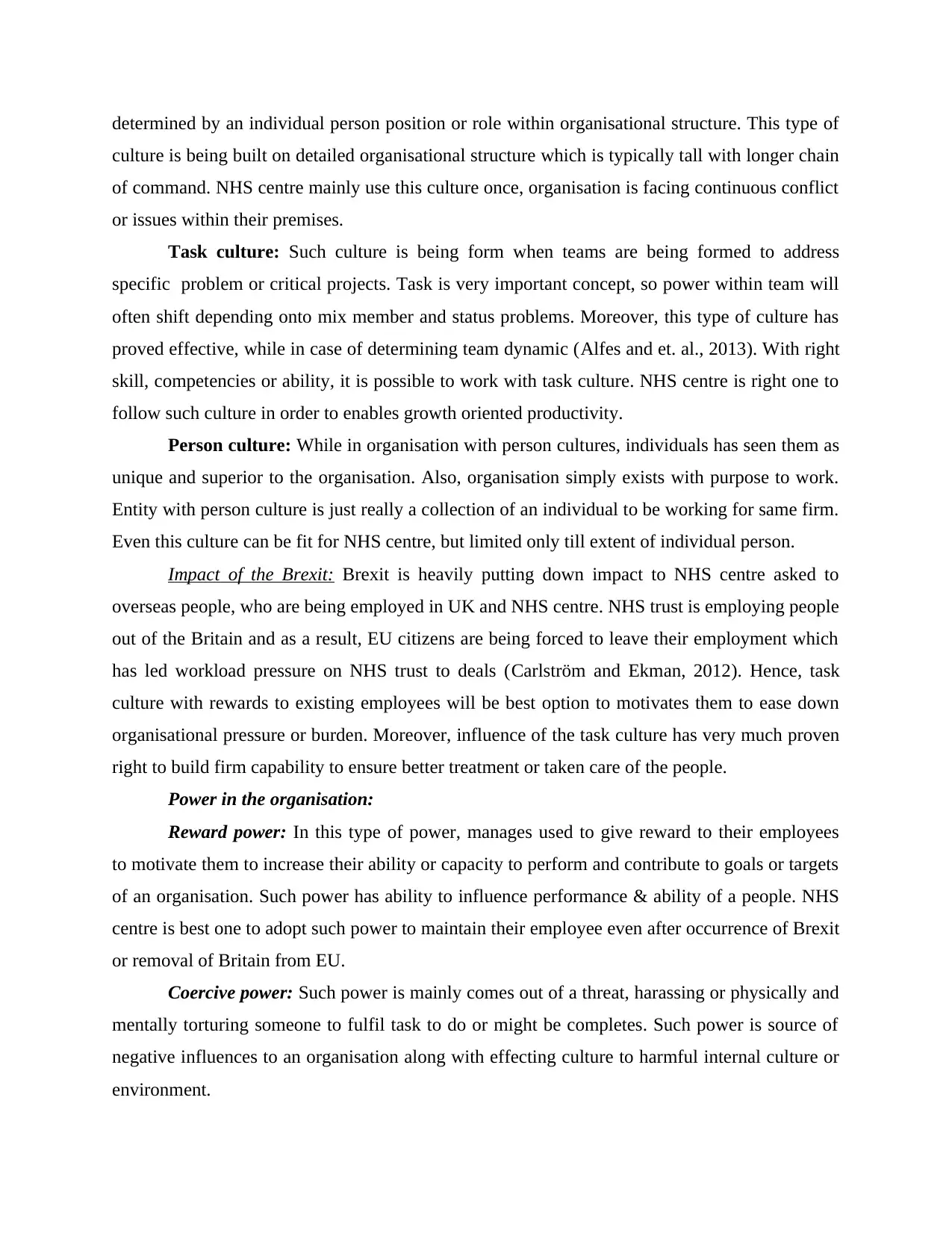
determined by an individual person position or role within organisational structure. This type of
culture is being built on detailed organisational structure which is typically tall with longer chain
of command. NHS centre mainly use this culture once, organisation is facing continuous conflict
or issues within their premises.
Task culture: Such culture is being form when teams are being formed to address
specific problem or critical projects. Task is very important concept, so power within team will
often shift depending onto mix member and status problems. Moreover, this type of culture has
proved effective, while in case of determining team dynamic (Alfes and et. al., 2013). With right
skill, competencies or ability, it is possible to work with task culture. NHS centre is right one to
follow such culture in order to enables growth oriented productivity.
Person culture: While in organisation with person cultures, individuals has seen them as
unique and superior to the organisation. Also, organisation simply exists with purpose to work.
Entity with person culture is just really a collection of an individual to be working for same firm.
Even this culture can be fit for NHS centre, but limited only till extent of individual person.
Impact of the Brexit: Brexit is heavily putting down impact to NHS centre asked to
overseas people, who are being employed in UK and NHS centre. NHS trust is employing people
out of the Britain and as a result, EU citizens are being forced to leave their employment which
has led workload pressure on NHS trust to deals (Carlström and Ekman, 2012). Hence, task
culture with rewards to existing employees will be best option to motivates them to ease down
organisational pressure or burden. Moreover, influence of the task culture has very much proven
right to build firm capability to ensure better treatment or taken care of the people.
Power in the organisation:
Reward power: In this type of power, manages used to give reward to their employees
to motivate them to increase their ability or capacity to perform and contribute to goals or targets
of an organisation. Such power has ability to influence performance & ability of a people. NHS
centre is best one to adopt such power to maintain their employee even after occurrence of Brexit
or removal of Britain from EU.
Coercive power: Such power is mainly comes out of a threat, harassing or physically and
mentally torturing someone to fulfil task to do or might be completes. Such power is source of
negative influences to an organisation along with effecting culture to harmful internal culture or
environment.
culture is being built on detailed organisational structure which is typically tall with longer chain
of command. NHS centre mainly use this culture once, organisation is facing continuous conflict
or issues within their premises.
Task culture: Such culture is being form when teams are being formed to address
specific problem or critical projects. Task is very important concept, so power within team will
often shift depending onto mix member and status problems. Moreover, this type of culture has
proved effective, while in case of determining team dynamic (Alfes and et. al., 2013). With right
skill, competencies or ability, it is possible to work with task culture. NHS centre is right one to
follow such culture in order to enables growth oriented productivity.
Person culture: While in organisation with person cultures, individuals has seen them as
unique and superior to the organisation. Also, organisation simply exists with purpose to work.
Entity with person culture is just really a collection of an individual to be working for same firm.
Even this culture can be fit for NHS centre, but limited only till extent of individual person.
Impact of the Brexit: Brexit is heavily putting down impact to NHS centre asked to
overseas people, who are being employed in UK and NHS centre. NHS trust is employing people
out of the Britain and as a result, EU citizens are being forced to leave their employment which
has led workload pressure on NHS trust to deals (Carlström and Ekman, 2012). Hence, task
culture with rewards to existing employees will be best option to motivates them to ease down
organisational pressure or burden. Moreover, influence of the task culture has very much proven
right to build firm capability to ensure better treatment or taken care of the people.
Power in the organisation:
Reward power: In this type of power, manages used to give reward to their employees
to motivate them to increase their ability or capacity to perform and contribute to goals or targets
of an organisation. Such power has ability to influence performance & ability of a people. NHS
centre is best one to adopt such power to maintain their employee even after occurrence of Brexit
or removal of Britain from EU.
Coercive power: Such power is mainly comes out of a threat, harassing or physically and
mentally torturing someone to fulfil task to do or might be completes. Such power is source of
negative influences to an organisation along with effecting culture to harmful internal culture or
environment.
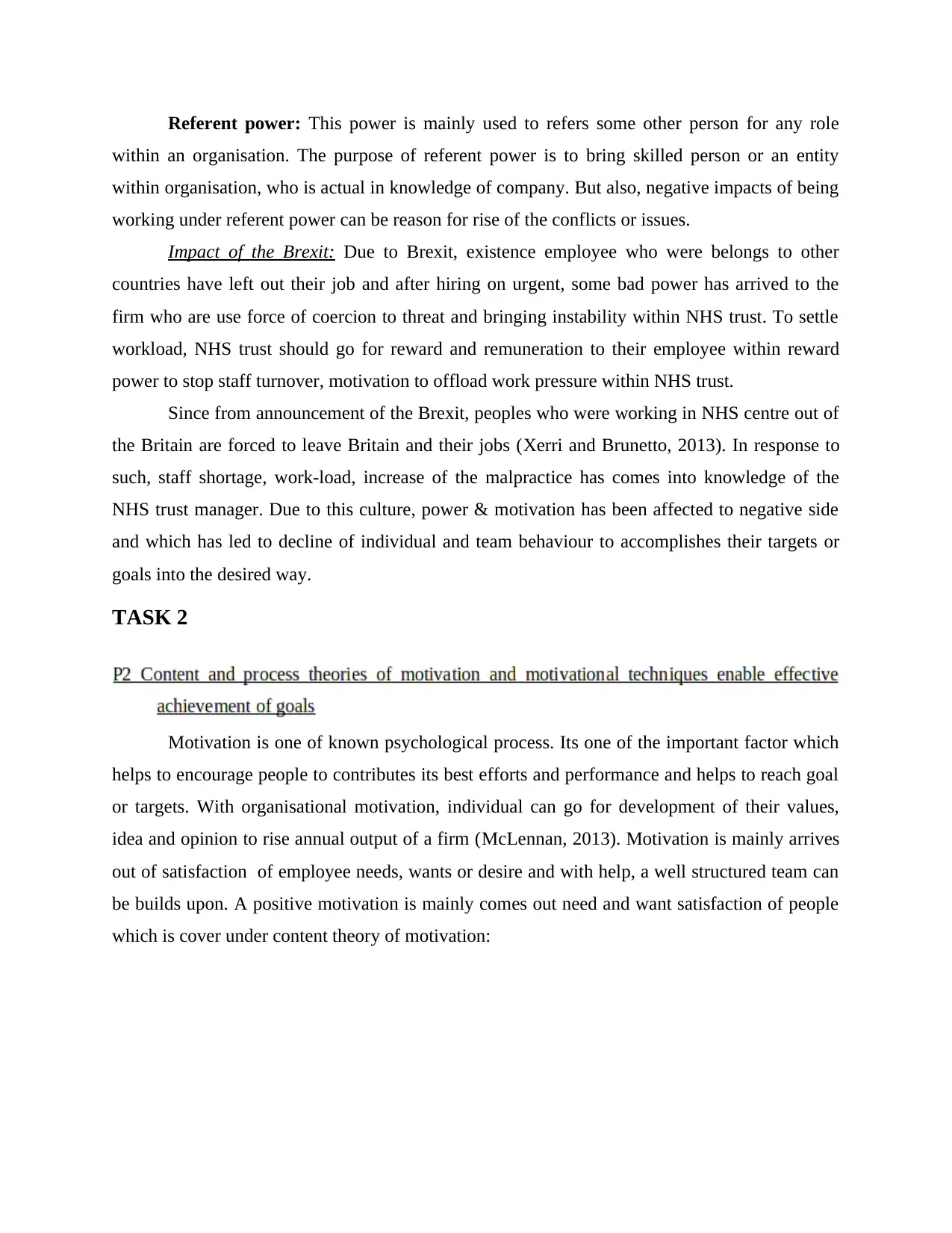
Referent power: This power is mainly used to refers some other person for any role
within an organisation. The purpose of referent power is to bring skilled person or an entity
within organisation, who is actual in knowledge of company. But also, negative impacts of being
working under referent power can be reason for rise of the conflicts or issues.
Impact of the Brexit: Due to Brexit, existence employee who were belongs to other
countries have left out their job and after hiring on urgent, some bad power has arrived to the
firm who are use force of coercion to threat and bringing instability within NHS trust. To settle
workload, NHS trust should go for reward and remuneration to their employee within reward
power to stop staff turnover, motivation to offload work pressure within NHS trust.
Since from announcement of the Brexit, peoples who were working in NHS centre out of
the Britain are forced to leave Britain and their jobs (Xerri and Brunetto, 2013). In response to
such, staff shortage, work-load, increase of the malpractice has comes into knowledge of the
NHS trust manager. Due to this culture, power & motivation has been affected to negative side
and which has led to decline of individual and team behaviour to accomplishes their targets or
goals into the desired way.
TASK 2
Motivation is one of known psychological process. Its one of the important factor which
helps to encourage people to contributes its best efforts and performance and helps to reach goal
or targets. With organisational motivation, individual can go for development of their values,
idea and opinion to rise annual output of a firm (McLennan, 2013). Motivation is mainly arrives
out of satisfaction of employee needs, wants or desire and with help, a well structured team can
be builds upon. A positive motivation is mainly comes out need and want satisfaction of people
which is cover under content theory of motivation:
within an organisation. The purpose of referent power is to bring skilled person or an entity
within organisation, who is actual in knowledge of company. But also, negative impacts of being
working under referent power can be reason for rise of the conflicts or issues.
Impact of the Brexit: Due to Brexit, existence employee who were belongs to other
countries have left out their job and after hiring on urgent, some bad power has arrived to the
firm who are use force of coercion to threat and bringing instability within NHS trust. To settle
workload, NHS trust should go for reward and remuneration to their employee within reward
power to stop staff turnover, motivation to offload work pressure within NHS trust.
Since from announcement of the Brexit, peoples who were working in NHS centre out of
the Britain are forced to leave Britain and their jobs (Xerri and Brunetto, 2013). In response to
such, staff shortage, work-load, increase of the malpractice has comes into knowledge of the
NHS trust manager. Due to this culture, power & motivation has been affected to negative side
and which has led to decline of individual and team behaviour to accomplishes their targets or
goals into the desired way.
TASK 2
Motivation is one of known psychological process. Its one of the important factor which
helps to encourage people to contributes its best efforts and performance and helps to reach goal
or targets. With organisational motivation, individual can go for development of their values,
idea and opinion to rise annual output of a firm (McLennan, 2013). Motivation is mainly arrives
out of satisfaction of employee needs, wants or desire and with help, a well structured team can
be builds upon. A positive motivation is mainly comes out need and want satisfaction of people
which is cover under content theory of motivation:
⊘ This is a preview!⊘
Do you want full access?
Subscribe today to unlock all pages.

Trusted by 1+ million students worldwide
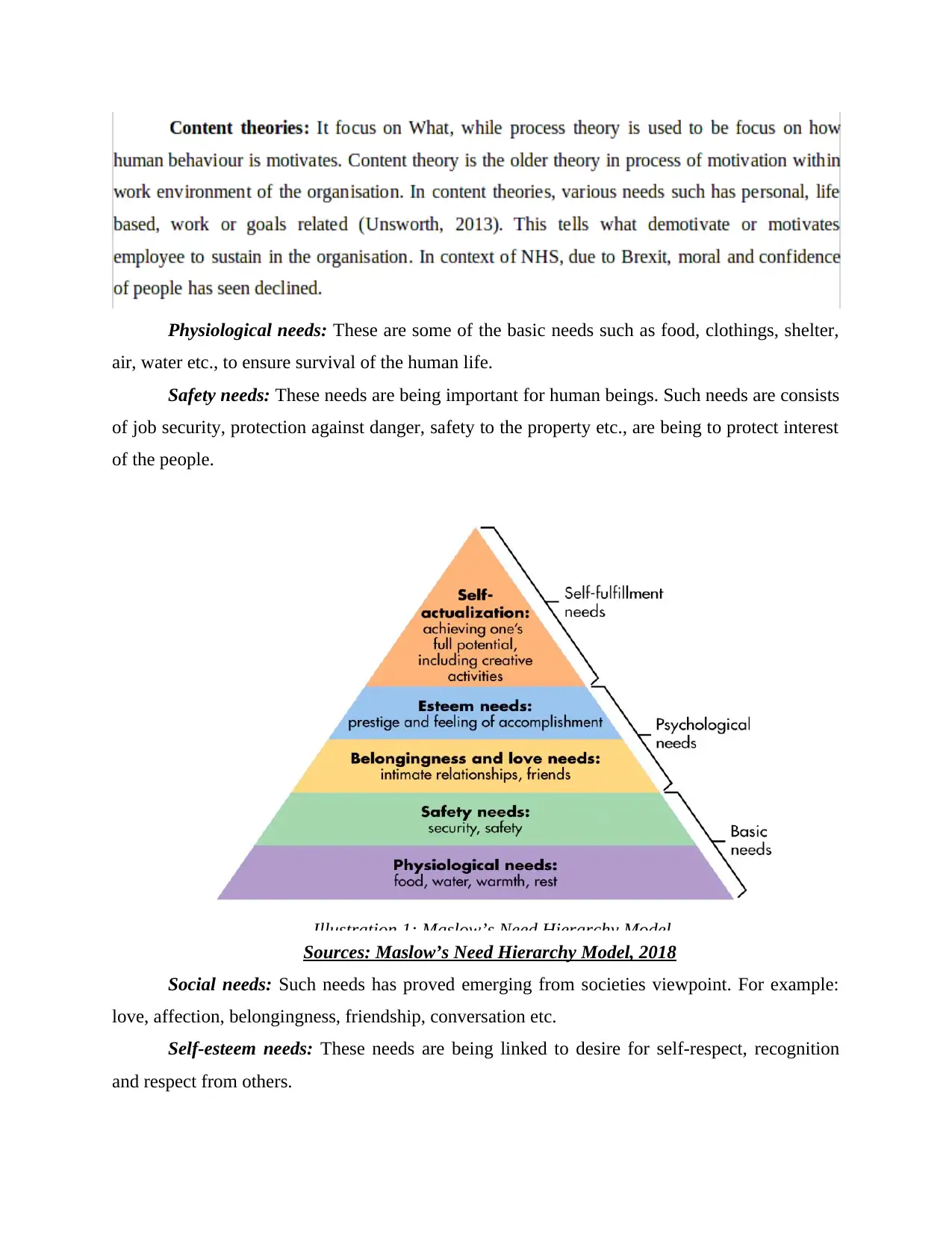
Physiological needs: These are some of the basic needs such as food, clothings, shelter,
air, water etc., to ensure survival of the human life.
Safety needs: These needs are being important for human beings. Such needs are consists
of job security, protection against danger, safety to the property etc., are being to protect interest
of the people.
Sources: Maslow’s Need Hierarchy Model, 2018
Social needs: Such needs has proved emerging from societies viewpoint. For example:
love, affection, belongingness, friendship, conversation etc.
Self-esteem needs: These needs are being linked to desire for self-respect, recognition
and respect from others.
Illustration 1: Maslow’s Need Hierarchy Model
air, water etc., to ensure survival of the human life.
Safety needs: These needs are being important for human beings. Such needs are consists
of job security, protection against danger, safety to the property etc., are being to protect interest
of the people.
Sources: Maslow’s Need Hierarchy Model, 2018
Social needs: Such needs has proved emerging from societies viewpoint. For example:
love, affection, belongingness, friendship, conversation etc.
Self-esteem needs: These needs are being linked to desire for self-respect, recognition
and respect from others.
Illustration 1: Maslow’s Need Hierarchy Model
Paraphrase This Document
Need a fresh take? Get an instant paraphrase of this document with our AI Paraphraser
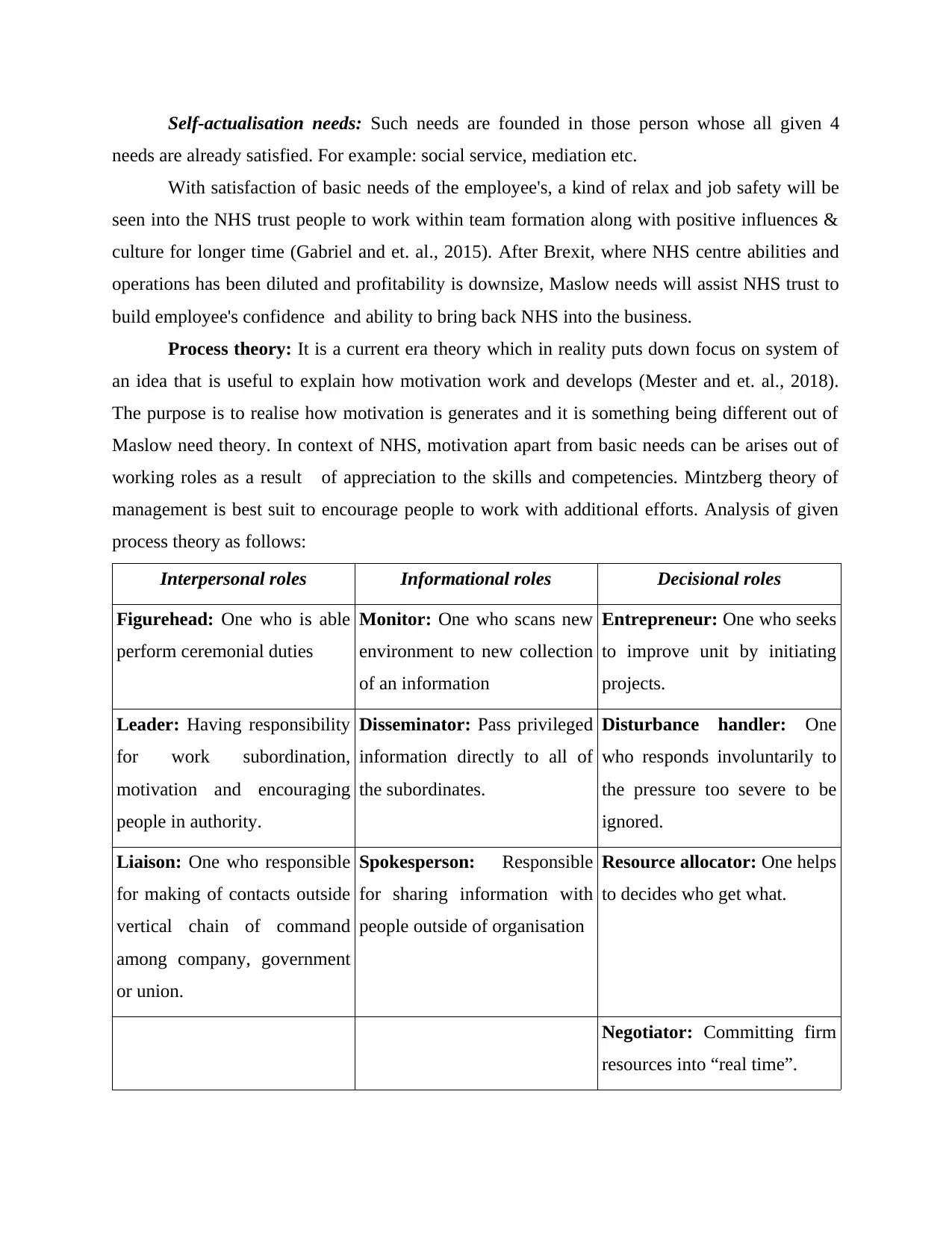
Self-actualisation needs: Such needs are founded in those person whose all given 4
needs are already satisfied. For example: social service, mediation etc.
With satisfaction of basic needs of the employee's, a kind of relax and job safety will be
seen into the NHS trust people to work within team formation along with positive influences &
culture for longer time (Gabriel and et. al., 2015). After Brexit, where NHS centre abilities and
operations has been diluted and profitability is downsize, Maslow needs will assist NHS trust to
build employee's confidence and ability to bring back NHS into the business.
Process theory: It is a current era theory which in reality puts down focus on system of
an idea that is useful to explain how motivation work and develops (Mester and et. al., 2018).
The purpose is to realise how motivation is generates and it is something being different out of
Maslow need theory. In context of NHS, motivation apart from basic needs can be arises out of
working roles as a result of appreciation to the skills and competencies. Mintzberg theory of
management is best suit to encourage people to work with additional efforts. Analysis of given
process theory as follows:
Interpersonal roles Informational roles Decisional roles
Figurehead: One who is able
perform ceremonial duties
Monitor: One who scans new
environment to new collection
of an information
Entrepreneur: One who seeks
to improve unit by initiating
projects.
Leader: Having responsibility
for work subordination,
motivation and encouraging
people in authority.
Disseminator: Pass privileged
information directly to all of
the subordinates.
Disturbance handler: One
who responds involuntarily to
the pressure too severe to be
ignored.
Liaison: One who responsible
for making of contacts outside
vertical chain of command
among company, government
or union.
Spokesperson: Responsible
for sharing information with
people outside of organisation
Resource allocator: One helps
to decides who get what.
Negotiator: Committing firm
resources into “real time”.
needs are already satisfied. For example: social service, mediation etc.
With satisfaction of basic needs of the employee's, a kind of relax and job safety will be
seen into the NHS trust people to work within team formation along with positive influences &
culture for longer time (Gabriel and et. al., 2015). After Brexit, where NHS centre abilities and
operations has been diluted and profitability is downsize, Maslow needs will assist NHS trust to
build employee's confidence and ability to bring back NHS into the business.
Process theory: It is a current era theory which in reality puts down focus on system of
an idea that is useful to explain how motivation work and develops (Mester and et. al., 2018).
The purpose is to realise how motivation is generates and it is something being different out of
Maslow need theory. In context of NHS, motivation apart from basic needs can be arises out of
working roles as a result of appreciation to the skills and competencies. Mintzberg theory of
management is best suit to encourage people to work with additional efforts. Analysis of given
process theory as follows:
Interpersonal roles Informational roles Decisional roles
Figurehead: One who is able
perform ceremonial duties
Monitor: One who scans new
environment to new collection
of an information
Entrepreneur: One who seeks
to improve unit by initiating
projects.
Leader: Having responsibility
for work subordination,
motivation and encouraging
people in authority.
Disseminator: Pass privileged
information directly to all of
the subordinates.
Disturbance handler: One
who responds involuntarily to
the pressure too severe to be
ignored.
Liaison: One who responsible
for making of contacts outside
vertical chain of command
among company, government
or union.
Spokesperson: Responsible
for sharing information with
people outside of organisation
Resource allocator: One helps
to decides who get what.
Negotiator: Committing firm
resources into “real time”.
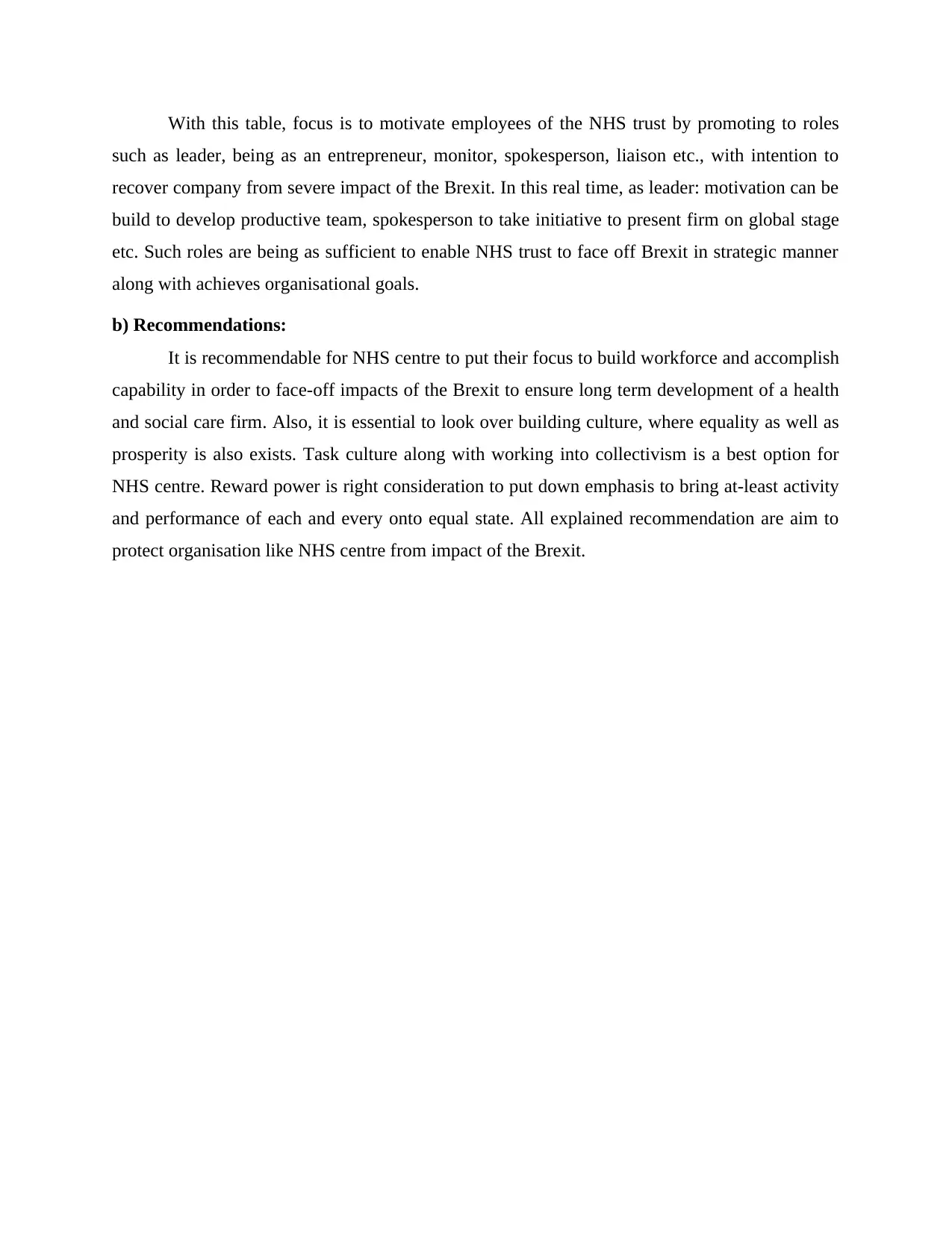
With this table, focus is to motivate employees of the NHS trust by promoting to roles
such as leader, being as an entrepreneur, monitor, spokesperson, liaison etc., with intention to
recover company from severe impact of the Brexit. In this real time, as leader: motivation can be
build to develop productive team, spokesperson to take initiative to present firm on global stage
etc. Such roles are being as sufficient to enable NHS trust to face off Brexit in strategic manner
along with achieves organisational goals.
b) Recommendations:
It is recommendable for NHS centre to put their focus to build workforce and accomplish
capability in order to face-off impacts of the Brexit to ensure long term development of a health
and social care firm. Also, it is essential to look over building culture, where equality as well as
prosperity is also exists. Task culture along with working into collectivism is a best option for
NHS centre. Reward power is right consideration to put down emphasis to bring at-least activity
and performance of each and every onto equal state. All explained recommendation are aim to
protect organisation like NHS centre from impact of the Brexit.
such as leader, being as an entrepreneur, monitor, spokesperson, liaison etc., with intention to
recover company from severe impact of the Brexit. In this real time, as leader: motivation can be
build to develop productive team, spokesperson to take initiative to present firm on global stage
etc. Such roles are being as sufficient to enable NHS trust to face off Brexit in strategic manner
along with achieves organisational goals.
b) Recommendations:
It is recommendable for NHS centre to put their focus to build workforce and accomplish
capability in order to face-off impacts of the Brexit to ensure long term development of a health
and social care firm. Also, it is essential to look over building culture, where equality as well as
prosperity is also exists. Task culture along with working into collectivism is a best option for
NHS centre. Reward power is right consideration to put down emphasis to bring at-least activity
and performance of each and every onto equal state. All explained recommendation are aim to
protect organisation like NHS centre from impact of the Brexit.
⊘ This is a preview!⊘
Do you want full access?
Subscribe today to unlock all pages.

Trusted by 1+ million students worldwide
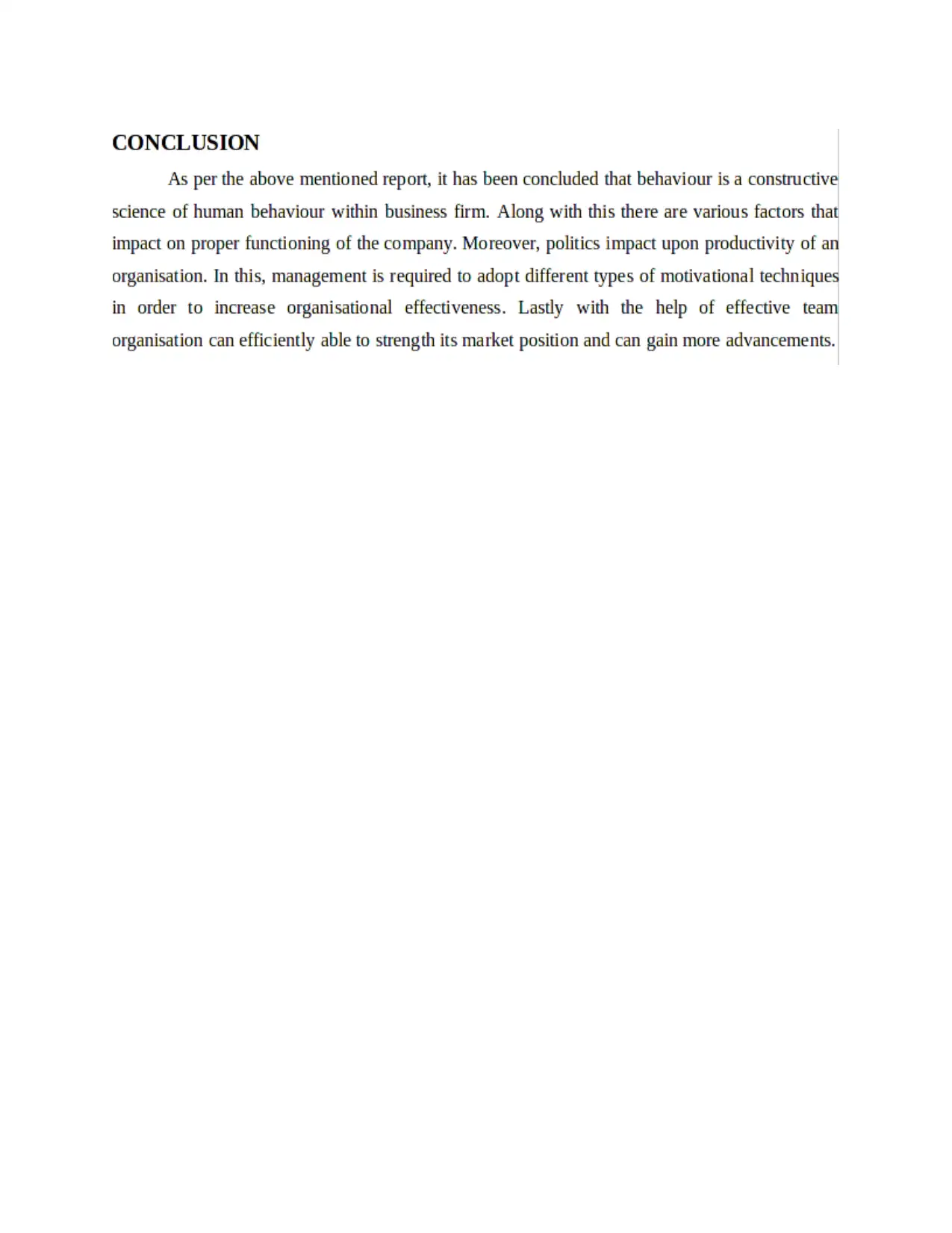
Paraphrase This Document
Need a fresh take? Get an instant paraphrase of this document with our AI Paraphraser
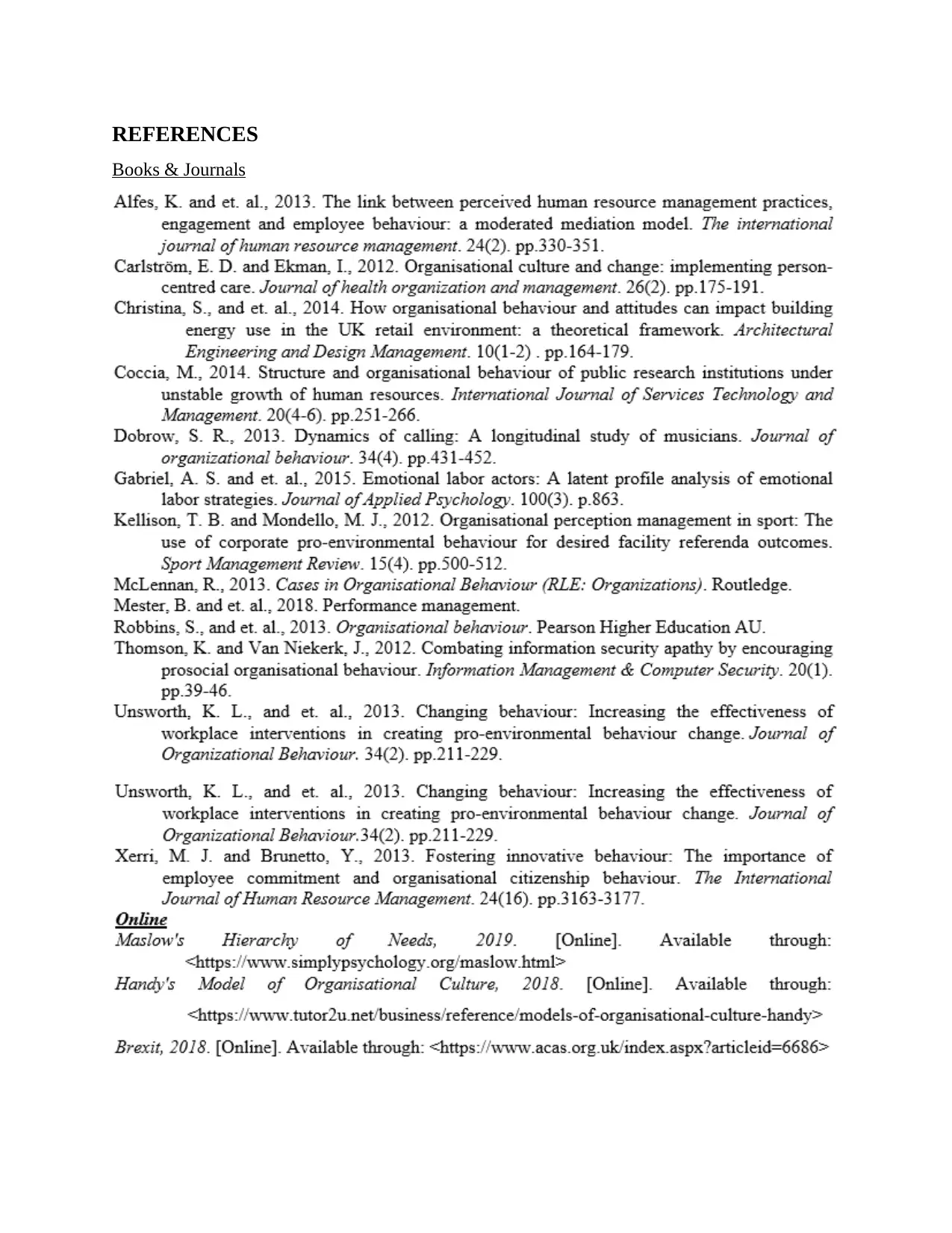
REFERENCES
Books & Journals
Books & Journals

⊘ This is a preview!⊘
Do you want full access?
Subscribe today to unlock all pages.

Trusted by 1+ million students worldwide
1 out of 12
Related Documents
Your All-in-One AI-Powered Toolkit for Academic Success.
+13062052269
info@desklib.com
Available 24*7 on WhatsApp / Email
![[object Object]](/_next/static/media/star-bottom.7253800d.svg)
Unlock your academic potential
Copyright © 2020–2026 A2Z Services. All Rights Reserved. Developed and managed by ZUCOL.




